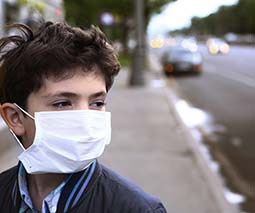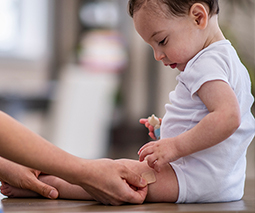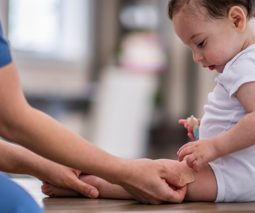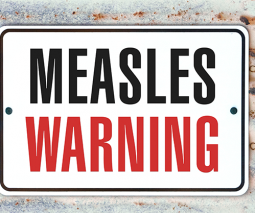Immunisation 101: Everything you need to know about vaccinating your child

There’s so much conflicting information out there about childhood vaccinations (especially if you spend a lot of time on social media) that it can be hard to know what’s accurate and what isn’t. It’s important to make sure you get your information from reliable sources, and your family GP or child health nurse is at the top of the list.
Here’s some things you need to know about vaccinations.
Why vaccinate?
While babies get some antibodies from mum during the final stages of pregnancy, and then through breastfeeding, this passive immunity is temporary and limited. Childhood immunisations give our babies the strongest lines of defence against some of the most devastating diseases in recorded history.
For immunisation to be most effective, a majority of the population needs to be vaccinated to stop bacteria and viruses that cause disease from spreading – this is known as herd immunity. Herd immunity protects the most vulnerable among us – including babies who are still too young to be vaccinated, people with compromised immune systems who can’t be vaccinated for one reason or another, and the elderly. Measles is one of the most severe and contagious diseases so high levels of herd immunity are needed to stop it getting a foothold in our communities. Keeping up to date with vaccinations is the best way of caring not just for your own child, but also for the whole community.
Combined vaccines
Our babies require most of their vaccines in their first few years of life when their immune systems are still developing. To reduce the number of vaccinations and the risk of missing a dose, some vaccines are combined. Examples of this include the combined diphtheria, tetanus, pertussis (DTPa) vaccine and the measles, mumps, rubella (MMR) vaccine.
How much do vaccinations cost?
List of vaccines
Hepatitis B – birth, two, four and six months
The Hepatitis B vaccine will protect your bub against a potentially life threatening liver disease or cancer caused by the hepatitis B virus.
Diphtheria – two, four, six, 18 months and four years
The Diphtheria vaccine protects bub from a bacterial disease that can cause breathing problems and heart failure.
Tetanus – two, four, six, 18 months and four years
The Tetanus vaccine prevents bub from a potentially life-threatening disease that can enter the bloodstream and attack the central nervous system causing muscle spasms, convulsions and lockjaw.
Whooping cough (pertussis) – two, four, six, 18 months and four years
Whooping cough (pertussis) is an extremely contagious respiratory infection that causes uncontrolled coughing, vomiting, pneumonia and brain damage and is particularly dangerous for babies under 12 months old. Adults who will be in contact with young babies ought to have a whooping cough booster every 10 years.
Haemophilus influenzae type b – two, four, six and 12 months
The Haemophilus influenzae type b (Hib) vaccine will protect bub from a range of serious diseases that cause meningitis, airway obstruction, blood and joint infections.
Polio (inactivated poliomyelitis) – two, four, six months, four years
The Poliomyelitis (Polio) vaccine protects against a highly contagious viral infection that can cause lifelong paralysis, and was once widely fatal in Australia.
Pneumococcal conjugate – two, four and six months
Pneumococcal disease can cause severe infections affecting baby’s blood and brain. Aboriginal and Torres Strait Islander children in some areas and children with specific medical conditions may need booster doses.
Rotavirus – two and four months
Rotavirus is the most common cause of gastroenteritis causing diarrhoea and fever in infants and young children and is highly contagious but this vaccine will help bub stop it from taking hold.
Meningococcal C – 12 months
This vaccine will help protect bub from a dangerous strain of Meningococcal disease, a life-threatening illness which can cause infection of the brain and blood leading to brain damage and loss of limbs.
Measles – 12 and 18 months
The Measles vaccine will help prevent serious health complications in young children, with one in every 15 children with measles developing pneumonia, and one in 1000 developing inflammation of the brain that can lead to brain damage.
Mumps – 12 and 18 months, four years
This vaccine will help protect bub from Mumps, which is a highly contagious viral infection that can cause serious complications, including infections of the testicles, infertility and permanent deafness.
Rubella – 12 and 18 months
This vaccine is bub’s first line of defence against Rubella (German measles), a contagious viral illness that causes fever, rash, swollen glands and brain inflammation, and if passed on to pregnant women early in their pregnancies can also cause birth deformities such as blindness, deafness and heart defects.
Chickenpox (Varicella) – 18 months
Chickenpox (Varicella) is a highly contagious virus that can cause skin infections, pneumonia and brain inflammation. If the mother is infected during pregnancy, it can cause birth deformities.
National Immunisation Registers
The registers capture information such as personal patient identification details, vaccination type and date given, details of vaccination provider and any medical exemptions. The Australian Immunisation Record (AIR) notes all vaccinations given in Australia, and can provide us time-poor parents with a copy of our child’s immunisation history on request to help us all to stay-up-to-date.
The AIR captures all National Immunisation Program (NIP), and most privately purchased vaccines, given to people of all ages and the HPV Register works alongside it by recording when young individuals receive the HPV vaccination through school-based programs.
(This is a sponsored post for the Victorian State Government)









